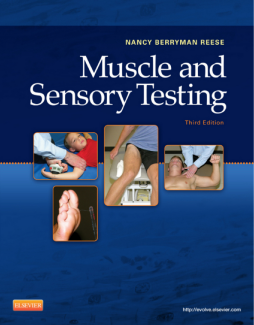
Additional Information
Book Details
Abstract
If you want to excel in the physical therapy field, you’ll need to first master the art of manual muscle testing. Written by a well-known PT expert, Muscle and Sensory Testing, 3rd Edition provides you with everything you need to effectively perform manual muscle and sensory tests – all in one well-organized, easy-to-follow resource. Chapters include an overview of muscle strength assessment and detail precise anatomic testing techniques for upper extremities, lower extremities, and head, neck and trunk; functional muscle tests; tests for mental status, cranial nerves and superficial reflexes; and use of observational gait analysis as a screening tool. Photographs of testing procedures, line drawings of various innervations, and video clips showing manual muscle testing procedures augment your understanding of this important skill area.
- UNIQUE! Video clips on the companion Evolve website showcase techniques involving muscle tests, handheld dynamometry, sensory and neurologic testing, clinician and patient positioning, and force application.
- Chapter 6: Techniques of Pediatric Muscle Testing covers the different techniques for manual infant muscle testing that help determine prognosis and treatment.
- Consistent chapter layout and organization by joint and muscle system allow you to quickly and easily locate the information you need.
- Instructions for performing hand-held dynamometry of major trunk and extremity muscles are clear and concise to ease your comprehension.
- Chapter on functional muscle testing demonstrates positioning, examiner instructions, and expected response for patients of all ages.
- Detailed neurologic exam instructions with photos help you perform accurate screening and interpret exam results.
- Coverage of techniques such as gravity-resisted testing and gravity-eliminated testing clearly shows you how to perform alternative methods of manual muscle testing.
- Hundreds of photos and illustrations demonstrate various techniques and landmarks to give you a clear understanding of positioning, stabilization, and common substitutions.
- Clinical notes highlight useful information about particular symptoms or conditions that you may encounter in practice.
- Case vignettes challenge you to apply your knowledge to real-world situations and think creatively about clinical problems.
- Overview of normal gait cycle serves as a resource for identifying gait deviations and associated muscle weaknesses.
- Evaluation of current research methods addresses the validity, reliability, and limitations of muscle testing techniques.
- Companion Evolve website contains additional, up-to-date information on this topic, such as pediatric data on the hand-held dynamometer.
